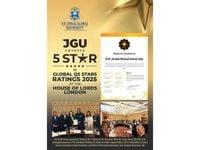The global higher education landscape is once again in the spotlight, as the latest QS World University Rankings and MBA program assessments spark both celebration and controversy across continents. Released in late September 2025, these rankings have propelled institutions like Imperial College London, the Wharton School, and O.P. Jindal Global University into the limelight, each for very different reasons. Yet beneath the surface of these accolades lies a simmering debate about what university rankings truly measure—and whether they serve the best interests of students, academics, and society at large.
Imperial College London, a storied institution renowned for its research and innovation, achieved a historic milestone in the 2026 QS World University Rankings. For the first time, Imperial claimed the top spot in both the UK and Europe, and climbed to second place globally. The university’s leadership described this as “a powerful endorsement of the talent, dedication and ambition” of its community, according to Felix. For many students, faculty, and alumni, the news was a source of immense pride. After all, who wouldn’t want to be associated with a university so highly regarded on the world stage?
But as the confetti settled, questions arose about the methods and motives behind such rankings. Hamid Khan, Open Research Manager at Imperial, cautioned that the companies producing these rankings are, at their core, profit-driven enterprises. "Rankings are methodologically flawed, often measuring inappropriate things: graduate salaries as a proxy for education quality, article citations and Nobel prize-winners for research excellence, reputation surveys that favour wealthy Western institutions," Khan noted in Felix. The lack of transparency in how data is used and scores are generated leaves many in the academic community scratching their heads. Do these metrics really reflect what matters most to students and researchers?
The critique doesn’t stop there. While rankings like those from QS or Times Higher Education (THE) are often wielded as marketing tools by universities, they rarely capture the quality of teaching—a factor that, arguably, should be at the heart of any educational institution’s mission. THE’s teaching category, for example, is based on reputation surveys, staff-student ratios, and institutional income, rather than direct measures of classroom experience. This disconnect is underscored by the 2024 National Student Survey, which revealed widespread dissatisfaction among Imperial students, particularly regarding assessment and feedback. As Felix pointed out, student satisfaction scores may not be perfect, but they do highlight how the lived experience of students can diverge sharply from what rankings suggest.
Meanwhile, in the world of business education, the QS MBA Ranking 2026 has shaken up the hierarchy of elite programs. The Wharton School at the University of Pennsylvania reclaimed the number one spot for the first time since 2020, outpacing rivals such as Harvard Business School, MIT Sloan, and Stanford Graduate School of Business. According to The Economic Times, Wharton’s ascent was driven by its exceptional performance across multiple metrics, including a first-place global ranking for Employability for the second year running, and top ten positions in Alumni Outcomes and Thought Leadership.
Stanford, which had enjoyed a five-year reign at the top, slipped to fourth place in this year’s evaluation. The top four MBA programs, all from the United States, underscore the enduring dominance of American business schools in the global education market. France’s HEC Paris made headlines as it overtook London Business School to become Europe’s highest-ranked MBA, securing fifth place worldwide. The broader top 20 is a transatlantic affair, with US and European institutions occupying every spot—11 from the US and nine from Europe. The National University of Singapore and Tsinghua University in China are Asia’s only representatives in the top 30, ranking 23rd and 28th respectively.
But even as these rankings shape the aspirations of thousands of prospective students, critics warn of their unintended consequences. The relentless pursuit of higher rankings can incentivize universities to prioritize legacy metrics and visibility over genuine improvements in teaching, research culture, or student well-being. As Felix observed, "At the summit, the only way is down. What if your rank drops? Luckily, the rankers offer consultancy services. They’ll sell your own data back to you, along with advice on how to climb again." The cycle, some argue, serves the interests of ranking companies more than those of universities or their stakeholders.
It’s not all skepticism and criticism, however. Some institutions are finding new ways to define and celebrate excellence. On September 24, 2025, at the House of Lords in London, O.P. Jindal Global University (JGU) was awarded the prestigious Global QS 5 Stars Rating Certificate, as reported by ANI. The accolade, presented by QS CEO Jessica Turner to JGU’s Vice Chancellor Professor (Dr.) C. Raj Kumar, recognizes the university’s outstanding performance across more than 50 indicators, including teaching, online learning, employability, arts & culture, sustainability, and governance.
JGU’s achievement is notable for its breadth. The institution earned 5 Stars in seven categories—Teaching, Online Learning, Employability, Environmental Impact, Arts & Culture, Good Governance, and Global Engagement—and 4 Stars in Law & Legal Studies and Research. With over 1,100 faculty members and a rapidly growing roster of international collaborations (more than 575 partnerships in over 80 countries), JGU is positioning itself as a leader in holistic, globally engaged education. The university’s Law School has been ranked India’s number one for six consecutive years in the QS World University Subject Rankings, further cementing its reputation.
Chancellor Naveen Jindal described the recognition as "a proud reflection of our vision of building a world-class institution in India," while Vice Chancellor Kumar emphasized the "lived ethos" of the JGU community. Dr. Ashwin Fernandes, Executive Director at QS, highlighted the rarity of a 5-Star Excellent Rating, calling it "a clear recognition of its holistic strengths across teaching, research, employability, sustainability, governance, and global engagement."
Yet even as some universities celebrate their rankings, others are choosing to step away from the game altogether. In 2023, Utrecht University withdrew from the Times Higher Education ranking, citing incompatibility with open principles, as reported in Felix. This move is part of a broader push by the More Than Our Rank initiative, which calls for more honest and valid approaches to evaluating academic institutions. The message is clear: universities can and should define their own standards of excellence, focusing on innovative teaching, open research, and student and staff well-being, rather than chasing after prestige or legacy metrics.
As the debate over university rankings continues, one thing is certain: the future of higher education will be shaped not just by numbers on a league table, but by the values, priorities, and choices of those who lead, teach, and learn within these institutions.




